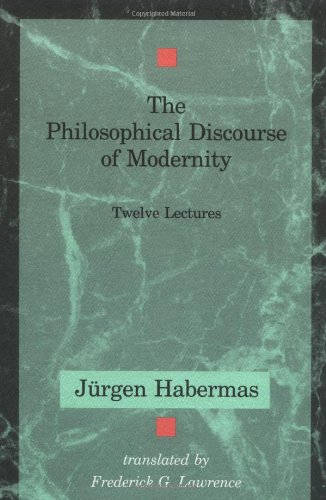The Philosophical Discourse of Modernity book
Par morgan zelma le mercredi, juin 22 2016, 00:48 - Lien permanent
The Philosophical Discourse of Modernity by Frederick Lawrence, Jurgen Habermas, Thomas McCarthy


The Philosophical Discourse of Modernity Frederick Lawrence, Jurgen Habermas, Thomas McCarthy ebook
Page: 456
Format: pdf
Publisher: Polity Press
ISBN: 0745608303, 9780745608303
Scientific reasoning does not sit easily with the presuppositions of any religion, and the work of Enlightenment philosophers made the belief in God appear irrational…It is easy to imagine Mohammed Atta, at Hamburg . "Modernity: An Unfinished Project" Habermas and the Unfinished Project of Modernity: Critical Essays on the Philosophical Discourse of Modernity. �Jürgen Habermas, The Philosophical Discourse of Modernity (1985; trans. Jürgen Habermas also employs excursuses (the English plural; not “excursi,” if we followed the Latin) in his masterful overview, The Philosophical Discourse of Modernity (1987). Miller (trans.), London: Allen & Unwin, Ltd. Jürgen Habermas, 'The Philosophical Discourse of Modernity' (1985). The Philosophical Discourse of Modernity, 1987. Aletheia [unconcealedness; truth] could be the word that offers a hitherto unnoticed hint concerning the essence of esse [to be]. Moral Consciousness and Communicative Action, 1990. Thus, on this line of reasoning, in the early twentieth century German philosopher Martin Heidegger theorized modernity as a huge system of “enframing” that reduced things to mere objects and functions available for human use. Lawrence (Cambridge, Mass: MIT Press, 1987). (truth, power, normality, normativity). This perspective is precisely part of a discourse of modernity that is established in the 19th century in the wake of the Industrial Revolution and becomes dominant in the USA after the Scopes trial in the 1920s. Hegel, G.W.F., 1969, Hegel's Science of Logic, A.V. In modernity philosophy is, for the most part (compare HS 28, where Foucault adds some qualification), not the activity of ethical transformation that aims at the existence transformed by truth. Foucault therefore asserts that the perception of the dangerous physical and spiritual effects of unrestrained sexual activity led to a moral and medical discourse about sex different in kind than that of ancient Greek ethical discourse. An attempt at a reevaluation of Neo-Kantianism, on the contrary, is to be found in Jiirgen Habermas, The Philosophical Discourse of Modernity, trans. Habermas, Jürgen, 1987, The Philosophical Discourse of Modernity, Frederick Lawrence (trans.), Cambridge: Cambridge University Press. No one else in the meeting had heard of Habermas. Maurizio Passerin d'Entreves and Seyla Benhabib.